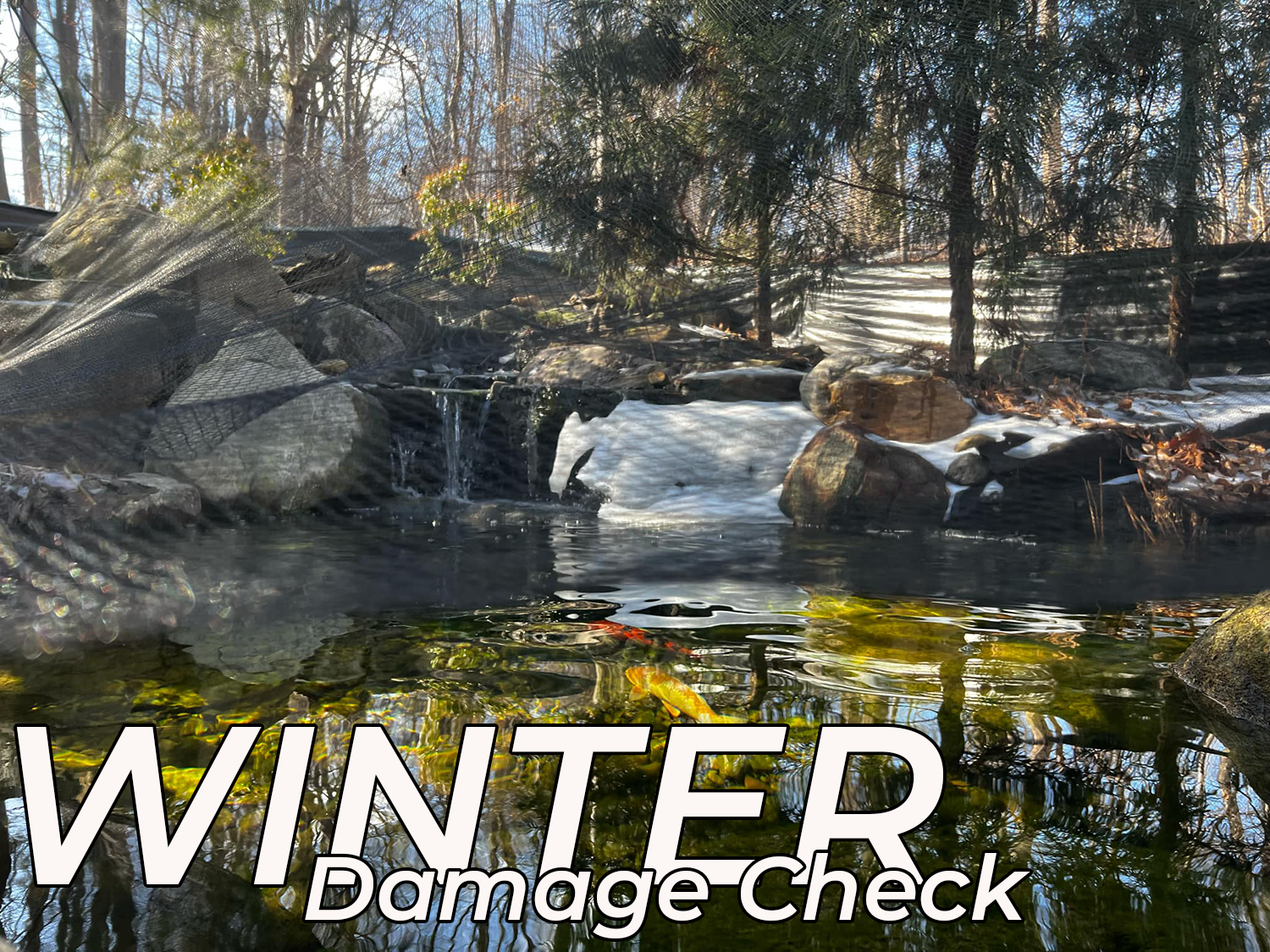
How to Check for Winter Damage in Your New Jersey Pond and Water Features
As winter comes to an end, it’s time to inspect your
New Jersey pond and water features for any damage caused by freezing temperatures, ice buildup, and harsh weather. Cracks, leaks, and equipment failures can lead to costly repairs if left unchecked. By performing a
thorough post-winter inspection, you can catch small problems before they become big ones.
Here’s how to check your
New Jersey pond for
winter damage and ensure everything is ready for spring!
1. Inspect the Pond Liner for Cracks or Leaks
Fluctuating temperatures can cause pond liners to expand and contract, leading to
cracks, tears, or leaks.
🔍
Walk around your pond and look for areas where the water level has dropped more than normal.
🔍
Check for soft or muddy spots around the edges—this could indicate a slow leak.
🔍
Inspect the liner for visible tears or damage from shifting ice.
If you find a
small tear, a pond liner repair kit may fix the issue. For
larger leaks, professional repair or replacement may be needed.
2. Check Pumps, Filters, and Plumbing for Ice Damage
If your
New Jersey pond or water feature wasn’t properly winterized, ice expansion may have caused
cracks in pipes, pumps, and filters.
⚙️
Reconnect your pump and test it at a low setting to see if it runs smoothly.
⚙️
Inspect tubing and plumbing connections for cracks, brittleness, or leaks.
⚙️
Check filter media for damage or excessive debris buildup.
If you notice
strange noises, reduced water flow, or leaks, your pump or filtration system may need repair or replacement.
3. Look for Structural Damage in Waterfalls & Fountains
Waterfalls, fountains, and decorative features are particularly
vulnerable to ice expansion during winter.
🧱
Check for cracks in stone, concrete, or fiberglass caused by freezing temperatures.
🧱
Inspect waterfall spillways and fountain nozzles for blockages or misalignment.
🧱
Ensure tubing and fittings are secure before restarting the system.
Cracks in stone or concrete may require
sealant application, while more severe damage might need professional restoration.
4. Examine Fish & Plants for Signs of Stress
Winter conditions can be tough on pond fish and aquatic plants. Before reintroducing full feeding and maintenance,
check on their health.
🐟
Observe fish behavior—are they active, or do they seem sluggish or stressed?
🐟
Look for signs of disease such as white spots, torn fins, or unusual swimming patterns.
🌿
Check plants for winter dieback and remove any dead or decaying material.
If fish seem unhealthy, test the water for
ammonia, nitrites, and pH imbalances before feeding.
5. Remove Debris & Refresh Water Quality
Winter can leave behind
leaves, sludge, and excess organic material that degrades water quality.
🧹
Skim out leaves and debris from the water’s surface and bottom.
🧼
Perform a partial water change (10-20%) to refresh the ecosystem.
💧
Add beneficial bacteria to kick-start your pond’s biological filtration.
A clean pond ensures a
healthier start to spring and prevents algae blooms.
6. Test & Balance Water Chemistry
Winter runoff and melting ice can alter your pond’s
water chemistry, making it unsafe for fish and plants.
🧪
Use a water test kit to check pH, ammonia, nitrites, and nitrates.
💧
Adjust pH gradually if it’s too high or too low.
💧
Add pond conditioner if introducing fresh water to remove chlorine and heavy metals.
Balancing your pond’s water chemistry early helps
prevent algae blooms and fish stress.
7. Gradually Restart Equipment & Monitor Performance
Once your
New Jersey pond is inspected and cleaned, it’s time to
restart pumps, waterfalls, and fountains—but do so carefully.
⚡
Turn on pumps at a low setting to prevent pressure surges.
⚡
Watch for leaks or weak water flow, which could indicate hidden damage.
⚡
Monitor your system for 24-48 hours to ensure everything runs smoothly.
A gradual restart prevents
unnecessary stress on your equipment and helps you catch any lingering issues.
Get Your New Jersey Pond Ready for Spring!
Checking for
New Jersey pond winter damage now can save you time, money, and headaches later in the season. By inspecting liners, equipment, and water quality early, you can ensure a
smooth transition into spring.
Discover more winter tips, tricks and information located on our learning hub at
Atlantis Water Gardens!
Check out these blogs:
How Do Seasonal Changes Affect Water Features?
Why Should New Jersey Homeowners Winterize Fountainscapes?
Why Are My New Jersey Koi Fish Hanging Around My Waterfall?
Don’t forget to check out our
YouTube channel for new projects every week!

